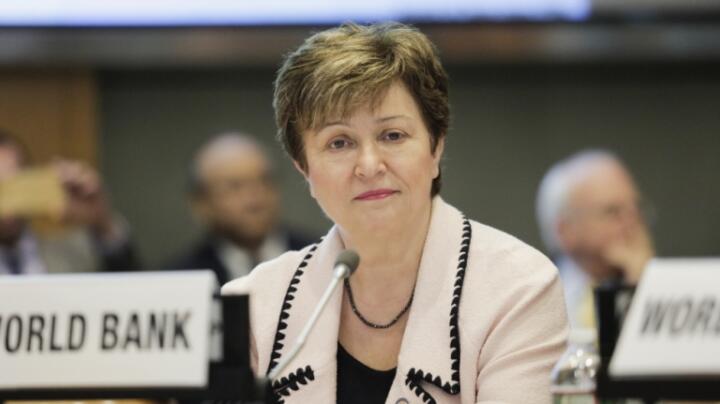Managing Director of the International Monetary Fund (IMF), Kristalina Georgieva, has raised concerns about the escalating conflict between Israel and Palestine, describing it as a new factor casting a shadow over the global economy.
She made these comments during a press conference at the ongoing World Bank/IMF summit held in Marakesh, Morocco. Georgieva’s remarks underscore the potential economic implications of the conflict, especially in relation to oil markets and their influence on the broader international financial landscape.
She emphasized the significance of closely monitoring the evolving situation and its specific impact on oil markets. “In terms of economic impact, we are very closely monitoring how the situation evolves, how it is affecting especially oil markets,” Georgieva stated. She acknowledged that there had been fluctuations in oil prices and market reactions as a result of the ongoing conflict, which further underscores the need for vigilant observation.

Despite the economic uncertainties arising from the conflict, Georgieva stopped short of making definitive predictions about its long-term effects, stating, “It is too early to say… And as I said, we will be closely monitoring this.” Her caution highlights the complexity of predicting economic consequences in the midst of a rapidly evolving and highly sensitive geopolitical crisis.
Georgieva eloquently summed up the prevailing situation by remarking, “Very clearly, this is a new cloud on not the sunniest horizon of the world economy.” Her words convey the prevailing mood among economic experts and international financial institutions, which are increasingly concerned about the unforeseen economic challenges that could emerge as a result of the conflict.
The recent clashes between Israel and Hamas have intensified an already volatile and deeply rooted conflict. Israel’s stated objective is to eradicate the Hamas movement, which governs the Gaza Strip, in response to what it perceives as the deadliest attack on Jews since the Holocaust. The latest escalation of violence began when hundreds of gunmen breached the barrier fence and launched attacks on Israeli towns. Since then, the death toll in Israel has risen significantly, with over 1,300 casualties, including many civilians who lost their lives in their homes, on the streets, or at social gatherings. In addition, several Israeli and foreign hostages were taken back to Gaza, further complicating the situation.
The extent of the human tragedy has become increasingly apparent as Israeli forces regained control of affected areas. Shocking reports of homes filled with the bodies of those who lost their lives, including women subjected to violence and children who were victims of gun violence and arson, have shaken the international community. Israel’s response to these events included the imposition of a total siege on the Gaza Strip, home to 2.3 million people, and the launch of a powerful bombing campaign that has left a trail of destruction throughout the region.
Gaza authorities have reported staggering casualty figures, with over 1,200 people killed and more than 5,000 wounded as a result of the bombings. The severity of the situation has been exacerbated by the shutdown of the only electric power station in Gaza, further straining the ability of hospitals to provide medical care, as they are running out of fuel for emergency generators.
While the immediate impact on the global economy has been limited, analysts are keeping a close eye on the situation due to the potential ramifications for crude oil prices. The conflict’s geographical proximity to key oil-producing regions and the potential for supply disruptions have raised concerns in financial markets. Already, there have been early signs of economic repercussions, with Chevron announcing a halt in natural gas exports via the East Mediterranean Gas (EMG) pipeline connecting Israel and Egypt. The decision was attributed to the ongoing violence in southern Israel. To ensure the continuity of natural gas exports, Chevron redirected them through the FAJR pipeline, which links Jordan and Egypt.
The situation remains fluid and highly unpredictable, making it a focal point of global attention, not only from a humanitarian perspective but also due to its potential to impact financial markets and the global economy. As the conflict continues to evolve, international financial institutions and experts like Kristalina Georgieva will continue to closely monitor its economic implications and adapt their strategies accordingly. The world waits anxiously for a resolution to the crisis, hoping for a return to stability and peace in the region.
Support InfoStride News' Credible Journalism: Only credible journalism can guarantee a fair, accountable and transparent society, including democracy and government. It involves a lot of efforts and money. We need your support. Click here to Donate
